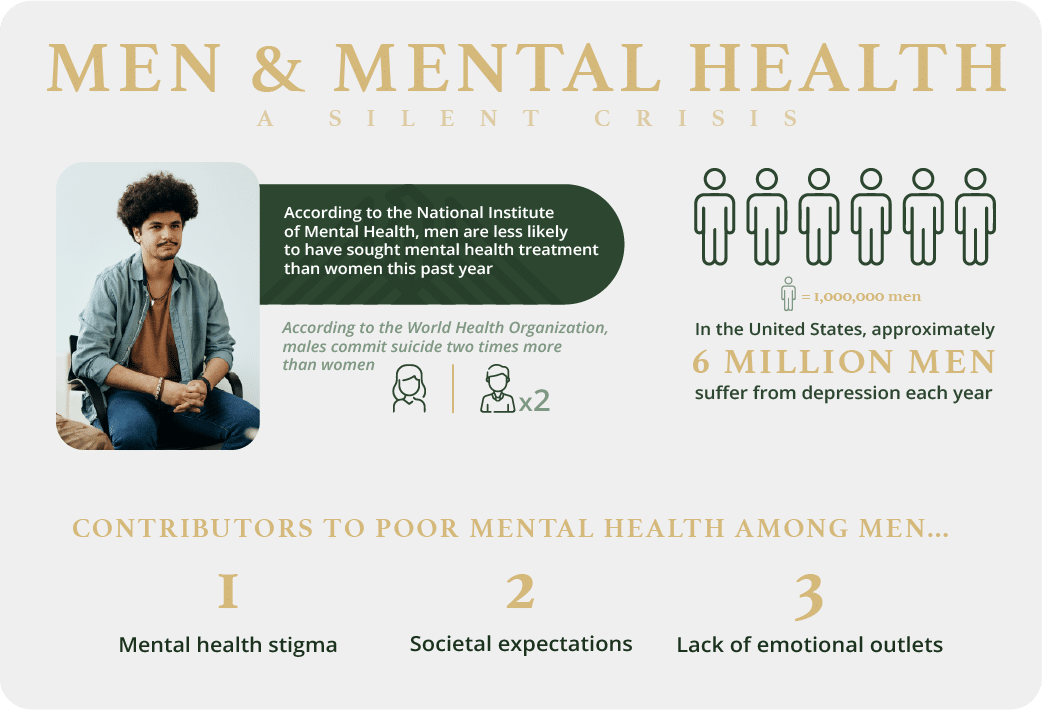
When men struggling with mental illness keep it inside and don’t seek treatment, they will often self-medicate with drugs or alcohol. Unfortunately, this worsens things and can lead to the development of co-occurring disorders, such as mental health and addiction.
When addressing men’s issues in recovery, it can be challenging for them to be honest about their mental health struggles like anxiety disorders and clinical depression. If you are struggling with mental health issues, find recovery and your life purpose at Eagle Creek Ranch Recovery in Nampa, Idaho.
Common Mental Health Conditions in Men
Statistically, men are more likely to struggle with certain mental health conditions, such as depression, anxiety, and post-traumatic stress disorder (PTSD). To cope with the symptoms of these conditions, men are more likely to self-medicate with drugs or alcohol. This can worsen and even exacerbate the condition and lead to substance use disorder (SUD).
When men’s mental illness is a silent crisis and goes untreated, it can worsen and lead to various health issues, relationship troubles, and difficulties at work.
Men and Mental Health: Overcoming Gender Stereotypes
According to the National Institute of Mental Health, men are less likely to have sought mental health treatment than women this past year. This isn’t because men don’t need treatment. Instead, the stigma stops them from seeking help. Unfortunately, several types of gender stereotypes affect men and the rates they seek treatment.
A social stigma is rooted in a misconception that a man’s mental health condition affects their character. For example, men who struggle with depression are weak. This gender stereotype stops men from seeking help and causes men’s issues in recovery, making it harder to be open about their struggles.
Cultural stigmas include beliefs and views of men and mental health conditions. They often make men’s mental illness a silent crisis by convincing men they must be intense. Cultural stigmas shape people’s beliefs and values, including their beliefs about seeking mental health treatment.
Differences in Condition Prevalence and Suicide Rates
Around the world, men are more reluctant to talk about their mental health issues than women. They are also more likely to die from suicide than women. According to the World Health Organization, males commit suicide two times more than women. This number is even higher in wealthier countries.
According to the Centers for Disease Control and Prevention, almost 80 percent of suicide deaths are by males. That is four times more often than females.
Over six million men struggle with depression yearly, which is less than women. However, men are less likely to seek treatment, so an exact number may be hard to get. A 2021 analysis from the CDC shows that many men who commit suicide do not have a documented mental health condition.
If you are a man struggling with anxiety, depression, or any other mental health issues, Eagle Creek Ranch Recovery can help you find a renewed outlook on life. If you are having suicidal thoughts, please call 911 right away.
Common Mental Health Problems for Men
Although men can experience a wide range of mental health conditions, some are more common than others. These mental health conditions include:
- Depression: Depressive conditions are characterized by a persistently low mood that interferes with daily life
- Anxiety disorders: Anxiety conditions are characterized by intense and uncontrollable anxiety and worry; examples include generalized anxiety disorder, social anxiety disorder, and obsessive-compulsive disorder
- Schizophrenia: A severe mental disorder where people do not interpret reality as it is; symptoms include hallucinations, delusions, and disordered thinking
- PTSD: Post-traumatic stress disorder is characterized by reliving traumatic experiences
- Substance use disorders: The uncontrollable abuse of substances such as alcohol, prescription medications, and illicit drugs, often a result of self-medicating to cope with mental health conditions
How Mental Illness Leads to Substance Abuse
Not only does mental illness often lead to substance abuse, but it can also cause a vicious cycle. Men struggling with mental illness may turn to drugs or alcohol to cope with and ease their symptoms. However, substance abuse can worsen symptoms and lead to more intense episodes.
Simultaneously, abusing drugs and alcohol can trigger mental illness. They change the chemistry in the brain and can lead to changes in mood, behavior, and cognition. This can lead to the development of a variety of mental health disorders.
Men struggling with mental health conditions and substance abuse have a dual diagnosis. Since the co-occurring disorders feed off each other, they must be treated simultaneously. Treatment centers specializing in dual diagnosis can address all men’s issues in recovery.
If you are self-medicating with drugs or alcohol, seeking help at Eagle Creek Ranch Recovery can help you overcome men’s issues in recovery.
How Do I Know If I Have a Mental Health Struggle?

Men struggling with depression, for example, may have more intense levels of anger, aggression, and irritability. They may also show other signs believed to be culturally acceptable. Females, on the other hand, may only show signs of low mood.
Most men don’t seek help until their symptoms become physiological, such as digestive issues, racing heart, or headaches. The National Institute of Mental Health says men are “more likely to see their doctor about physical symptoms than emotional symptoms.”
Common Mental Health Symptoms in Men
Men typically display common symptoms of mental health conditions, including:
- Aggression
- Anger
- Irritability
- Frustration
- Drug and alcohol abuse
- Difficulty concentrating
- Constant worry
- Engaging in risky behavior
- Ignoring daily responsibilities
- Suicidal thoughts
Physical symptoms of men’s mental illness include:
- Appetite changes
- Digestive issues
- Changes in sleep patterns
- Unexplained aches and pains
Since men struggle to be honest about their mental health and often overlook their symptoms, everyone needs to know what to look out for
Treatment for Men With Addiction and Mental Health Disorders
When men receive treatment for addiction and mental health disorders, the chances of lasting mental and physical recovery increase. Psychotherapy, or individual therapy, is a significant part of treatment.
Individual therapy addresses the issues and past trauma that triggered a mental health condition and addiction. Trained therapists use various forms of therapy to help men change negative thoughts and behaviors into positive ones. Men also learn healthy coping skills to reduce the risk of relapse.
Cognitive-behavioral therapy (CBT) is a common therapy used to treat addiction and a variety of mental health conditions. It is beneficial in treating depression, PTSD, schizophrenia, and more. CBT is highly structured and increases the motivation in men to set goals and work to reach them.
Struggling with addiction and mental health disorders causes men to feel out of control. CBT helps men feel more in control mentally and emotionally. This act alone relieves some of the men’s stress and increases their desire to change.
Dialectical behavior therapy (DBT) is often confused with CBT. It is based on CBT but adapted for people who feel emotions deeply.
CBT focuses on helping men understand their negative thoughts and behaviors and change them to positive ones. DBT focuses on helping people accept the reality of their lives and helps them learn to change.
Motivational interviewing (MI) is based on the idea that all people are capable of change and motivates them to make the change. Therapists use reflective listening, open-ended questions, and self-directed dialogue to help men find that internal voice screaming for change. Motivational interviewing aims to help men realize they are responsible for their well-being and recovery.
Sometimes therapy isn’t enough to help men manage symptoms of mental health conditions. In cases like this, a doctor may prescribe medications. However, some of these medicines have adverse side effects and should be monitored closely.
Medications to relieve men’s issues in recovery include:
- Anti-depressants
- Anti-anxiety medications
- Anti-psychotics
- Sleep aids
How to Raise Awareness About the Men’s Mental Health Crisis

Ways to bring awareness to men’s mental illness a silent crisis include:
- Talking openly about men’s mental illness
- Educate yourself and others
- Volunteer in awareness events
- Make mental well-being a part of your and your family’s daily lives
One of the best things parents can do for their boys is to start making mental health important at a very young age. This not only creates healthy boys, teens, and men, it can end the generational stigma facing men today.
Treatment for Addiction and Mental Illness for Men at Eagle Creek Ranch Recovery
If you or another man in your life is struggling with mental health conditions or addiction, it’s time to prioritize your mental health. At Eagle Creek Ranch Recovery in Nampa, Idaho, we offer a variety of therapies to address all men’s issues in recovery. Contact us today to start your journey to lasting recovery.

Clinical Director
Kendall Maloof is the clinical director at Eagle Creek Ranch Recovery. She is a licensed marriage and family therapist and has held multiple leadership roles before settling here at Eagle Creek Ranch Recovery. Kendall received her master’s degree in marriage and family therapy from the Chicago School of Professional Psychology in 2016. Her career in mental and behavioral health began in 2014 when she took up internships in both the nonprofit and for profit sectors. She interned at multiple reputable companies, such as The Living Success Center and 449 Recovery in California.
In 2019, Kendall became the clinical director of Sunsets Recovery for Woman, a dual diagnosis program in southern California. Kendall is a natural leader. She has an incredible ability to problem solve and stay calm in any situation. Kendall never fails to show up when she is needed, and her calm demeanor makes her team and clients feel at ease. Eagle Creek Ranch Recovery is proud to have Kendall as our clinical director.




